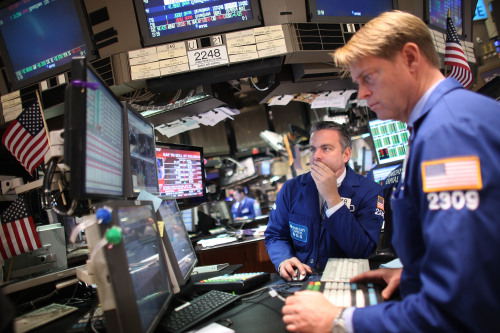BANGKOK (AP) ― Asian markets tumbled Tuesday, a day after Standard & Poor’s warned that it might lower its rating on U.S. government debt.
The announcement raised concerns about the world’s No. 1 economy and expectations of cuts in government spending. Benchmark crude for May delivery dropped 42 cents to $106.70 a barrel. On Monday, the contract settled at $107.12 on the New York Mercantile Exchange.
Japan’s Nikkei 225 index slid 1.5 percent to 9,413.99; Hong Kong’s Hang Seng index was down 1.3 percent to 23,514.65 and South Korea’s KOSPI gave up 0.5 percent to 2,126.60. Benchmarks in mainland China, Singapore, Taiwan, Australia, New Zealand and the Philippines also lost ground.
“Standard & Poor’s decision to put the U.S.’s ‘AAA’ sovereign debt rating on negative watch took markets by surprise. Yesterday’s knee-jerk reaction was to sell equities and seek the U.S. dollar as a safe haven currency,” DBS Bank Ltd. in Singapore said in a report.
“The rest of the world needs to come to terms that the U.S. can no longer sustain its role (as) the consumer of last resort for the global economy indefinitely,” DBS said.
The announcement raised concerns about the world’s No. 1 economy and expectations of cuts in government spending. Benchmark crude for May delivery dropped 42 cents to $106.70 a barrel. On Monday, the contract settled at $107.12 on the New York Mercantile Exchange.
Japan’s Nikkei 225 index slid 1.5 percent to 9,413.99; Hong Kong’s Hang Seng index was down 1.3 percent to 23,514.65 and South Korea’s KOSPI gave up 0.5 percent to 2,126.60. Benchmarks in mainland China, Singapore, Taiwan, Australia, New Zealand and the Philippines also lost ground.
“Standard & Poor’s decision to put the U.S.’s ‘AAA’ sovereign debt rating on negative watch took markets by surprise. Yesterday’s knee-jerk reaction was to sell equities and seek the U.S. dollar as a safe haven currency,” DBS Bank Ltd. in Singapore said in a report.
“The rest of the world needs to come to terms that the U.S. can no longer sustain its role (as) the consumer of last resort for the global economy indefinitely,” DBS said.

The warning from S&P on Monday sent Wall Street on its steepest slide in a month. S&P said there is a 33 percent chance it would lower the country’s credit rating from ‘AAA’ in the next two years if Washington fails to pare the country’s debts.
The Dow Jones industrial average, the S&P 500 index and the Nasdaq composite all had their sharpest falls since March 16. The Dow fell 1.1 percent to close at 12,201.59. The Standard & Poor’s 500 fell 1.1 percent to 1,305.14. The Nasdaq composite also fell 1.1 percent to 2,735.38.
Japanese stocks continued to struggle in the aftermath of the country’s worst-ever earthquake. Toyota Motor Corp., which experienced severe production disruptions due to supply shortages, was down 2.8 percent.
Shares of Henan Shuanghui Investment and Development Co., which resumed trading Tuesday on the Shanghai Composite Index after a one-month suspension following a food scandal, dropped by its daily limit of 10 percent, Xinhua news agency reported.
Trading had been suspended after allegations surfaced that tainted pork was found being sold by Shuanghui Group, China’s largest meat processor. The pork was combined with clenbuterol, a banned drug that causes pigs to convert fat to muscle quickly.
Clenbuterol is illegal because it can cause nausea, dizziness, headaches and heart palpitations in humans, but pig farmers like to use it because it helps yield more lean meat, which is costlier than fatty meat.
The euro was lower to $1.4226 from $1.4234 late Monday in New York. The dollar slipped against the yen to 82.55 from 82.71 yen.







![[KH Explains] How should Korea adjust its trade defenses against Chinese EVs?](http://res.heraldm.com/phpwas/restmb_idxmake.php?idx=644&simg=/content/image/2024/04/15/20240415050562_0.jpg&u=20240415144419)










![[Today’s K-pop] Stray Kids to return soon: report](http://res.heraldm.com/phpwas/restmb_idxmake.php?idx=642&simg=/content/image/2024/04/16/20240416050713_0.jpg&u=)